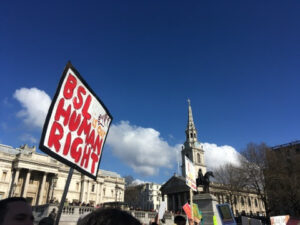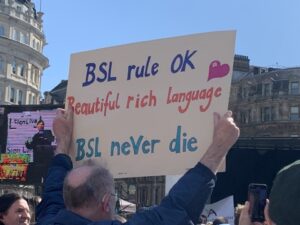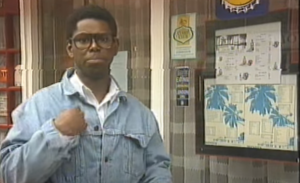‘It’s easy to be the same as your Deaf community, but it’s very difficult to find that sense of sameness as a Black Deaf person.’ – Kevin Buckle
 ISJ student intern Emily Howarth talks to YSJ Graduate Research Fellow Kevin Buckle about the importance of representation, history and culture for members of the Black Deaf community.
ISJ student intern Emily Howarth talks to YSJ Graduate Research Fellow Kevin Buckle about the importance of representation, history and culture for members of the Black Deaf community.
There currently seems to be more media coverage of the Deaf community than ever before. The BSL Act, which gives legal status to BSL in the UK, has just passed its second reading in the House of Lords. The film CODA, starring a predominantly Deaf cast just won Best Picture at the Oscars, with Troy Kotsur winning Best Supporting Actor, the first Deaf person to win this award. And of course, Deaf actress Rose Ayling-Ellis won the most recent series of Strictly Come Dancing.
But the fight for equal access, opportunity and fundamental rights for the Deaf community is still far from over, and this battle becomes even more complex when you belong to more than one marginalised group.
Last week I had the privilege of sitting down with Kevin Buckle, Graduate Research Fellow here at York St John. Kevin is currently working towards his PhD, with a focus on intersectionality in the Deaf community and Black Deaf identity. Our conversation (via BSL interpreter) centred around Kevin’s experience of being a Black Deaf person living in the UK, a minority within a minority.
Throughout our interview, we kept returning to the importance of education. During his schooling, Kevin wasn’t taught anything about either Deaf history or Black history. In his 2018 BSL Zone interview, he said that he believes he was late developing his identity, and that a sense of ‘lagging behind’ is something that is often felt in marginalised communities. This feeling is rooted in representation and education. If you are taught nothing about your own history and culture, and never see yourself represented, it can be incredibly challenging to establish a sense of identity and confidence.
The first time Kevin learned anything about Black history was during his time working for Southwark Council in the late 80’s, when they set up a Black History Month exhibition. He recalls this as a real breakthrough moment for him, finally seeing some of his culture and history represented. This exhibition inspired him to learn more about Black history, as well as analysing how his Black identity intersected with his Deaf identity. Kevin said, ‘So where did you pick up on racism? You can hear it, if you are in the hearing Black community. But the Deaf Black community didn’t pick up on most of it, so had no idea what was really happening. How people use sign language, it was not really racist, because it wasn’t a concept. You were more likely to feel oppression as a Deaf person in the hearing community, rather than as a Black person in the white community.’
The Black Deaf community is very small, which means representation is limited. In Kevin’s words, ‘You look around, and there is nobody else who is Black and Deaf, and therefore you become quite marginalised within your own community… In the hearing world, there had been some representation and some people talking about this stuff, but there was nobody who was Black and Deaf, being represented through the media.’
Kevin himself has been instrumental in representing the Black Deaf community. Launched in 1981, See Hear is a monthly programme produced for Deaf and Hard of Hearing audiences. It covers a range of subjects relevant to the Deaf community, and is presented in BSL, with voiceover and subtitles. It’s the BBC’s 5th longest running factual series, and Kevin was its first ever Black presenter. The programme aired in 1992, and Kevin hosted a segment on Black Deaf identity in the UK. He was 28 at the time and quite nervous to take on the challenge, going back and forth with the BBC for several months before deciding to accept. This is the first time anything surrounding this topic had been presented on British television. Kevin commented: ‘To be noticed finally, you know, it’s like a breakthrough.’
We are now 30 years on from this See Hear appearance, and I asked Kevin about the impact of the programme, and whether he thinks it helped to raise awareness about Black Deaf people. He said ‘I think there was some recognition, but I’d say awareness is a very slow process. Because it boils down to education, it’s a major factor. It’s easy to be the same as your Deaf community, but it’s very difficult to find that sense of sameness as a Black Deaf person. So, you know, if there have been lots and lots and lots and lots of programmes, there could have been much more absorption and recognition and raising the profile.’ He commented, ‘Representation is very important. But the ‘See Hear’ episode was a one off, it just happened once. It’s a unique representation of that time, and so few have happened since.’
In light of our discussion around the importance of education and learning, I asked Kevin what his advice would be for someone who is interested in learning sign language:
‘So it depends where you live, but I would say get yourself to the local FE college. Going somewhere face to face is really important. And the local colleges should have something, because you need to learn not only the language but the history at the same time.
I think the culture of the Deaf community is probably the foundation of learning of sign language. After that, you can get yourself off on a course and get going. That’s very important – there needs to be that foundation of history and culture.’
If you are interested in learning BSL, award-winning teacher Amanda Smith is running a course at YSJ from this October. Find out all the details on the ‘Introduction to BSL’ short course listing.

Protest sign from recent BSL Rally held in Trafalgar Square

